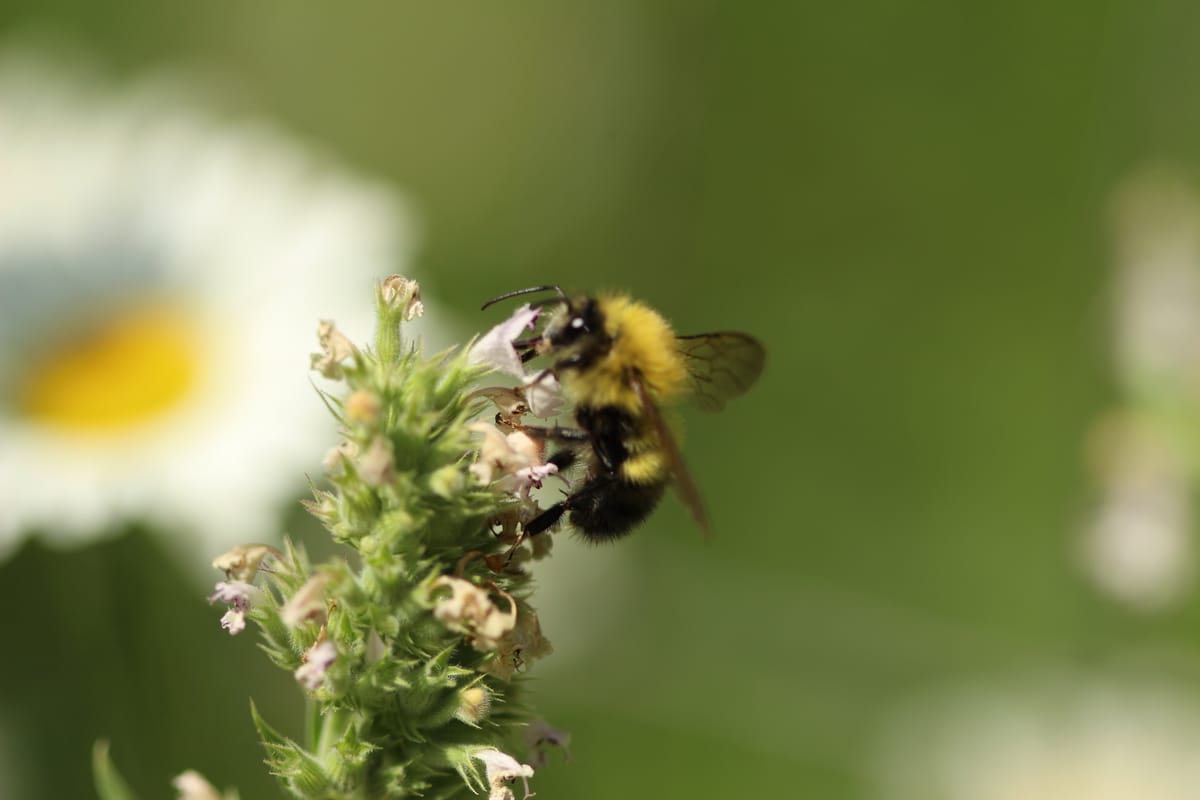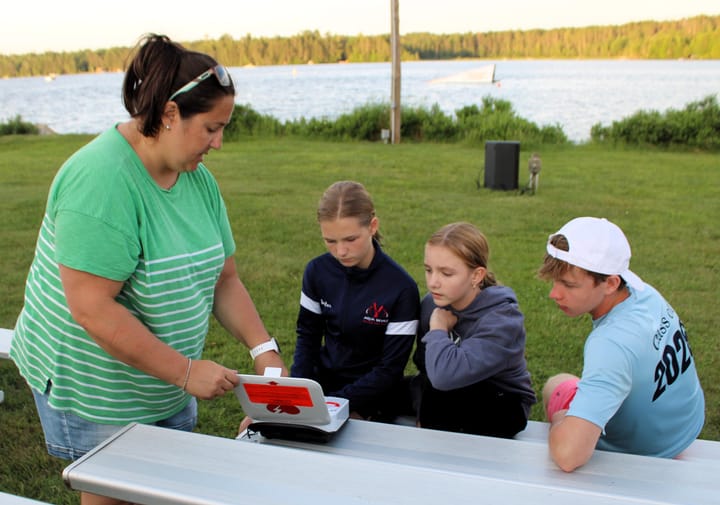Cut Pesticide Use for Pollinators

"Give me spots on the apples, but leave me the birds and the bees, please." —Joni Mitchell, Big Yellow Taxi
This week, June 16-22, marks the 2025 National Pollinator Week which celebrates the vital role that pollinators play in ecosystems, economies and agriculture. These crucial creatures include bees, butterflies, moths, bats, beetles and hummingbirds.
On a local level, many of these types of animals are being affected by the increased use of pesticides — particularly insecticides that aim to reduce annoying or disease-carrying bugs like mosquitoes and ticks. These poisons affect not only the pollinators themselves, but also the other animals further up the food chain that rely on insects and other critters designated as "pests" as a food source.
Insecticides are designed to kill insects, often leading to fatalities for pollinating insects. Even if they are not directly sprayed, these beneficial bugs can come into contact with residues on treated plants, or ingest contaminated nectar and pollen. A pesticide doesn't need to be sprayed directly on a pollinator to cause harm; coming into contact with them can have serious effects that impair their ability to survive or reproduce.
While herbicides may not directly target insects, they kill weeds which can often be important nectar and pollen sources for pollinators, thus reducing food available. It can also kill off important habitats. Rodenticides in the bodies of deceased rodents can be ingested by other animals like eagles, foxes, owls, etc., causing harm.
Homeowners can take small steps like avoiding use of these toxins in their yards and gardens, and prioritizing the use of native flowers, trees and shrubs that can provide consistent food sources to native pollinators.
Increases in Local Pesticide Use
According to Oneida County Land and Water, in recent years, the fear of mosquito-borne illnesses and sense of physical discomfort has led many Wisconsinites to apply insecticides in their yards in order to kill adult mosquitoes. The application is either done through a hired contractor specializing in mosquito control or self-application. These treatments are also billed as remedies against other pest insects such as ticks.
The department said the products used may vary in name; however, none of the insecticides used are species-specific, meaning that many beneficial insects are harmed by exposure to the chemical. Furthermore, only some mosquito species are likely to carry illnesses dangerous to humans, and mosquitos in general actually play a vital role in the balance of the ecosystem.
Otto Oemig, Pesticide Programs Unit supervisor for the Wisconsin Department of Agriculture, Trade and Consumer Protection (DATCP), defined "pesticide" by state and federal law as any substance or mixture of substances intended for preventing, destroying, repelling, or mitigating any pest. This includes herbicides, insecticides, fungicides, rodenticides, and surface sanitizers and disinfectants.
Oemig explained that the DATCP has seen a statewide increase in the number of pesticide applicators certified in the 5.0 Aquatic and Mosquito pesticide application category, but noted the agency is responsible for enforcing state and federal pesticide regulations in Wisconsin and does not make recommendations for or against its use.
He said the EPA is the authority responsible for reviewing and approving pesticides for use. "During their registration process, the EPA evaluates the ecological impacts of that pesticide's use. Thus, different pesticides have different effects on insects, animals, and the landscape," Oemig added. He went on to explain that the EPA does not allow the term "safe" to be used with any of its registered pesticides, but noted that pesticide labels generally include language on how to minimize off-target exposure to people, pollinators, and wildlife.
"When it comes to pesticides, the label is the law," he said.
Firsthand Effects
Beyond the damage they do to pollinators, wildlife rehab groups are seeing firsthand the effects these poisons can have on the local fauna. Marge Gibson, executive director of Raptor Education Group, Inc. (REGI) in Antigo, recently admitted a very sick bald eaglet from Gleason that was suffering from not only lead poisoning, but also the effects of ingesting a rodenticide.
Gibson made a public plea for people to be very mindful of the various "-cides" being used as they can have far-reaching effects not only on the intended creatures, but those further up the food chain.
"The fact is they (pesticides) are meant to do this because they kill the target species; however, other beings encounter or eat the insects, rats, mice, or even rabbits as they munch on foliage sprayed with herbicides," Gibson said.
She said REGI has been seeing an increasing number of cases involving multiple toxins, and recounted a family that a few weeks prior admitted a fledgling bird that was affected by seizures. The bird was too young to have flown into the window to cause the damage, so Gibson asked the family if they had sprayed any pesticides recently. They indicated they had, and that a salesman had promised them it was "safe."
"It seems our society has reached a point where it has become natural to resort to poisons to kill every annoying insect, mosquitoes, and even fungus on flowers with herbicides. Please consider the potential repercussions of your actions on wildlife and your family," Gibson said.
"I will promise you that chemical company salesmen will tell you that what they are spraying is safe. It is good to remember they are selling you something, and that something is an insecticide. The suffix CIDE means to kill, and it does kill. If you poison a bird or an animal's food supply, you kill that bird and its family as well. We must use our minds and the reasoning ability that comes with them. We can do better. Please do better," she pleaded.
Alternatives to Pesticides
As more people turn to pest companies that perform insecticide services, or perform their own pesticide applications in the form of fogging machines and sprays, groups speaking out on behalf of the environment urge homeowners to look at alternatives.
The Xerces Society — an invertebrate conservation agency — calls spraying a "blunt and ineffective tool" as a strategy for controlling mosquitoes that "creates a false sense of security while causing many unintended and far-reaching consequences" such as putting pollinators at risk. It goes on to say that the best strategy is a preventative measure that limits where mosquitoes reproduce — stagnant water.
"Here's where you can really make a contribution because the source of this problem may be right under your nose, or over your head. Standing water might be sitting on your property — in garbage cans, buckets, pots, birdbaths, fountains, gutters, corrugated drain pipes, or old tires. You can do your part year-round by making sure these sorts of items are draining, emptied, and/or kept dry. Water shouldn't sit for more than a couple of days, especially when temperatures are warm," the society said.
It also urges people to protect themselves from mosquito bites by wearing long sleeves when mosquitoes are active, using mosquito repellent, and keeping screens in good repair.
The Xerces Society notes that until the last century, pesticides were made from plant extracts or mineral-based materials such as copper, and people relied much more heavily on preventative techniques such as crop rotations and sanitation. But in the 20th century, synthetic pesticides were designed to control a variety of pests, including DDT, glyphosate (found in a number of products including Roundup), 2,4-D (in many weed and feed products), and imidacloprid (one of the neonicotinoid insecticides). The society offers a lengthy explanation of various types of pesticides and how they came to be commercially used here.
Read the Instructions, Check for Licensing
UW-Madison's Department of Entymology studies mosquitoes and mosquito-borne diseases, and has looked into how to responsibly use insecticides to keep the biters at bay. The department says insecticides can be applied to vegetation around homes for temporary reduction in biting pressure, via sprayers or foggers, but caution against using these too frequently.
"One or two applications of insecticide during a season should not cause problems. These applications should be done by individuals who understand the risks associated and use proper protective clothing and technique during application. Although these chemicals will not provide permanent reduction of mosquitoes, they may temporarily reduce the populations to comfortable levels for an outdoor event," the entymology department said.
"However, mosquito biologists and other entomologists anticipate that too-frequent insecticide application by spray, fog or home misting systems will have adverse effects. In particular, dispensing pesticides at daily or weekly intervals, without using information about mosquito populations to determine whether application is needed, is simply bad practice."
When hiring pest reduction companies, DATCP recommends homeowners check on the licensing status before bringing them onto their property to spray.
"In Wisconsin, commercial pesticide applicators need to be certified, individually licensed, and must work for a licensed pesticide application business," Oemig said. "Homeowners should make sure that companies and applicators they hire are licensed by DATCP, and they can look online to see if an individual or business is licensed."
Homeowners can follow the links find out if an individual is licensed as a pesticide applicator, if a pesticide applicator is certified, or if a pesticide business is licensed. DATCP conducts routine inspections of licensed pesticide applicators and companies to ensure compliance with pesticide regulations.



